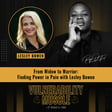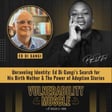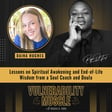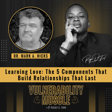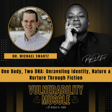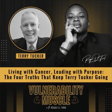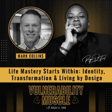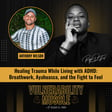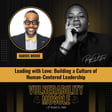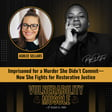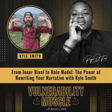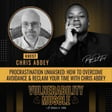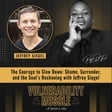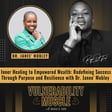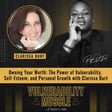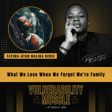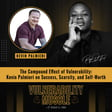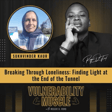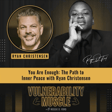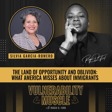Trusting Self and Embracing Vulnerability
00:00:00
Speaker
She had to know that she could trust herself to handle the amount of pain that was going to come up and rage because there was rage as well as pain. And she had to know that I could handle both her pain and her rage.
00:00:12
Speaker
And so she fed it to me in very small doses. Welcome to Vulnerability Muscle, the inspiring podcast, challenging norms, and helping you redefine vulnerability as a strength.
00:00:23
Speaker
I'm your host, Reggie D. Ford. Each episode of Vulnerability Muscle dives into a variety of topics such as mental health, social issues, and mindset shifts.
Podcast's Focus on Mental Health and Mindset Shifts
00:00:34
Speaker
We explore the power of vulnerability and fostering meaningful connections. healing, building resilience, and promoting personal growth. Sometimes these conversations are uncomfortable, but good workouts often are.
00:00:48
Speaker
So join us and flex that vulnerability muscle. Welcome, welcome, welcome to this episode of Vulnerability Muscle. I'm your host, Reggie D.
Guest Introduction: Phyllis Levitt's Expertise
00:00:58
Speaker
Ford. And today I have with me Phyllis Levitt.
00:01:02
Speaker
Phyllis has a master's degree in psychology and counseling from Antioch University. She co-directed the Parents United Sexual Abuse Treatment Program in Santa Fe, New Mexico for two years and then went into private practice full time.
00:01:17
Speaker
Phyllis has treated children, families, couples, and individual adults for 34 years and has worked extensively with abuse and dysfunctional family dynamics, their aftermath, and some of the most important elements for healing.
00:01:33
Speaker
She has two previous books, A Light in the Darkness and Into the Fire.
America's Divisiveness Through a Psychological Lens
00:01:39
Speaker
Her latest book, America in Therapy, A New Approach to Hope and Healing for a Nation in Crisis, published by Morgan James Publishing, explores the roots of divisiveness and violence in America from a psychological point of view.
00:01:54
Speaker
with the goal of bringing the best of what heals relationships and restores us to safety and to nash into a national conversation. Phyllis lives with her husband in New Mexico and is now focusing on writing and speaking.
00:02:10
Speaker
Phyllis, welcome to Vulnerability Muscle. How are
The Role of Community in Healing
00:02:13
Speaker
you? I'm really good. Thank you so much for having me here with you today. I am so glad to have you here. And I am i love the background that you have in psychotherapy and the approach that you've taken and all the folks that you've helped. So I just want to first start by saying thank you, because I know that work is, it is consuming. It is ah lifelong journey. And I'm sure there are stories and people that you have held on to for a really long time and supported. And so thank you for the work that you've done.
00:02:45
Speaker
Well, and thank you. And thank you for saying that. And also, I just want to say thank you to all the people that helped me along my way. So, you know, it's like it's really a gift that once you receive it, you want to keep giving.
00:02:58
Speaker
Yes, yes. I love that. And I, again, I too have had so many people help me along the way and just so thankful for the the both clinical folks and non-clinical folks who have been a part of my healing journey. It is the community that just pours into us and makes us feel that we are whole. That is the journey of healing is getting back to that wholeness.
00:03:23
Speaker
Exactly. Before we jump into just a discussion between us two, i like to start with a segment called what comes to mind.
Vulnerability: Key to Realness and Salvation?
00:03:31
Speaker
And so three questions and you let me know the first things you can think of.
00:03:36
Speaker
What comes to mind when you hear the word vulnerability? Yeah, I mean, I feel teary just from talking to you so far, but I think vulnerability is actually the key to our salvation as a human race. Right.
00:03:51
Speaker
Because it's it's really the capacity to just be real, to be real about our gifts and our and our offerings and our contribution, to be real about the places we've been hurt, to be real about the healing journeys we might have been on and what we've learned.
00:04:11
Speaker
And also, you know, one one of the things that I've learned being a psychotherapist and being a client myself is that there's two kind of big aspects to vulnerability. And one of them is to just be able to like have your feelings and talk about your pain and, you know, your imperfections and the places where you have regrets and, um and, and what hurt you you, know, from other people, whether it's individual people or societally or gender wise or whatever,
00:04:42
Speaker
but also to be able to be vulnerable about the ways that we've hurt other people. yeah Because it just it's just part of being human that but we've been hurt and that we hurt others.
Impact of Emotion Suppression on Men of Color
00:04:54
Speaker
And i know in my own life, and I've seen this as a therapist, that when people can just really own the whole thing, it gives us permission to just be human and to be fallible and also to be great.
00:05:07
Speaker
Yeah. Yes. Oh, that is such a beautiful answer. Thank you for that. Because I think one thing you said is is to feel our emotions, to experience our emotions. And I think that one piece alone in vulnerability has been suppressed by so many people.
00:05:24
Speaker
I did the first season of vulnerability muscle with all men of color and a group of people who have suppressed emotions, who have been taught that that is the way to be a man. And that is the way to show up. And it steals humanity.
00:05:38
Speaker
Absolutely. It fills our humanity. And so to be able to express those emotions, to be able to express the wrongdoings that happen to us and the things that we have done to others, that is beautiful. because we are you know And I just want to add, like, I grew up that way, too.
00:05:54
Speaker
I grew up not feeling any permission to have my feelings or express them. And I felt like they were a flaw. I felt like it was something I had to hide then and that I should be ashamed of.
00:06:07
Speaker
And that I had to show the world that I was just put together and fine when I wasn't. And I think so many people suffer from that. And therapy is one place where you can open up and have the safety to do that.
00:06:20
Speaker
But just being with safe people who know how to be vulnerable gives us that permission to.
Phyllis' Personal Journey and Inspiration for Therapy
00:06:25
Speaker
It does. Oh, that's beautiful. I'm already loving this container that we're building. So thank you for being you.
00:06:32
Speaker
What do you do to center yourself when you're feeling stressed, chaotic, depressed? Yeah. I mean, i do a lot of things. Um, I love being in nature.
00:06:43
Speaker
My husband and I live up in the mountains. We have national forest around us. So we hike, um, we go camping. I love to have a garden. i have a million house plants that I, you know, yes get luck get and give love to every day.
00:06:58
Speaker
um also meditate and I journal um and I connect with people that are like-minded and that are loving. So those are some of the big things I do also like to cook sometimes.
00:07:12
Speaker
man what what's What's a go-to recipe for you? Oh, you know, I live in New Mexico, so I'm really into the Mexican food. I love it. And they're one of my favorite recipes is something called taco soup. And it's just a big mixture of lots of things with a lot of red chili in it. really That's so good. I love that. I love that.
00:07:33
Speaker
And lastly, what is one of your favorite childhood memories? You know, I think I really connected with nature when I was little. And I loved being at the ocean. We used to go to the ocean in the summertime for a week or two, and that was a very special and favorite place of mine. I just like to watch the waves, actually.
00:07:54
Speaker
Mm-hmm. That's good. nate Nature is a theme that keeps coming up out here, and it's so beautiful. and this I'm in Nashville, Tennessee and in the city, and um there is ah there are places where within minutes I can get out into nature and beautiful parks and just escape the city, and I love it.
00:08:13
Speaker
But even right here and at home, I have two monitors right here, and they just there's trees, and it's the forest. Beautiful. I love being in nature as well, so I love that. What inspired you to to pursue a path in in psychotherapy?
00:08:27
Speaker
what What was that inspiration like? Yeah. And that's a perfect question for your show on vulnerability because I had some significant early childhood trauma that really colored my life in a very, very profound way.
00:08:42
Speaker
i had a lot of pain growing up that I just tried to hide and suppress. and And when I was young, nobody talked about psychotherapy. Nobody talked about childhood trauma. Nobody talked about family dynamics. Nobody talked about healing.
00:08:58
Speaker
You were just supposed to get a good education, get married and have kids and make money. And that was pretty much it. So I had no language for what was happening inside of me. And it wasn't until I was in my thirties and I had three little children by that time. um And in a pretty dysfunctional marriage that I was starting to hear about people going to therapy and And I went to therapy and it really changed my life.
00:09:27
Speaker
And, you know, I had no idea before that, that your childhood could really affect your whole, the whole rest of your life because nobody ever said that. um And I just thought the problem is me.
00:09:40
Speaker
I didn't think the problem got to be in my family somewhere. you know Yeah. Yeah. so that was life-changing. after my very first session, i went to the library and took out books on psychology and i ended up becoming a psychotherapist because remembering, i had forgotten what happened to me because it was so traumatic that I repressed it.
00:10:03
Speaker
um And I was beginning to have memories. i went to graduate school in psychology and I was in a hypnotherapy class and in my hypnotherapy class,
00:10:14
Speaker
the memories really started to come up like full force. um So I became a psychotherapist and it was a very, very gratifying career for me.
00:10:26
Speaker
When you say ah repressed, i just yes just can you distinguish that from being suppressing emotion or so suppressing memories and things versus
Understanding Repression and Suppression of Memories
00:10:36
Speaker
repressed? What is the difference between those for the audience? Well, I'm not sure if I know the difference, but what I would say what I'm talking about is I forgot.
00:10:43
Speaker
I buried the memories. Not everybody does that. But I did. yeah and so I had like, you know, I think when you bury memories, there's stuff that sort of leaks out around the edges.
00:10:56
Speaker
So for me, it was like intense fears. I was terribly afraid of the dark. I was terribly afraid spiders. was, i really did not like being alone.
00:11:09
Speaker
i had a lot of anxiety and I had really bad nightmares, really bad nightmares. So it was like coming up around the edges, like trying to get my attention. But of course, I didn't know what was trying to get my attention.
00:11:22
Speaker
until I began to actually remember. Wow. Wow. My understanding is is suppression suppression is a conscious thing that we do. okay we Okay. And we consciously, like there's an experience, there's something that we know is is we don't want to feel, we don't want to remember.
00:11:40
Speaker
and We put that in a box. Whereas repression happens to a lot of us where It's unconscious and we don't make that choice. And it's our brain's way of protecting us from some of those scary things that it doesn't want to open up.
00:11:54
Speaker
And so just, I think, understanding that and giving ourselves grace for things that may have affected us from our past, that we can, um that that is there, ah we can uncover it through a lot. You said hypnotherapy, is it hypnotherapy you said in that class? It hypnotherapy that I did in a class. And then I did it privately, you know, as a client.
00:12:16
Speaker
what What does that look like? Cause i don't think I've ever done that. Well, what I did was not like, you know, somebody waving, you know, a pendulum in front of you and you go into a trance. It wasn't anything like that. I was fully conscious. It was more like guided visualization back
Healing Trauma and Breaking Family Cycles
00:12:33
Speaker
And there was the the techniques for doing that. And the kind of the guy it's got guided imagery of like, you know, going down in a safe place and, um,
00:12:45
Speaker
you know, asking your psyche to take you where you need to go to heal. And, you know, your psyche follows. And, um but I did, I did want to say one thing about the distinction you made between repression and suppression, because I did both.
00:12:59
Speaker
I repressed the memories and I suppressed as much as I possibly could the feelings, but not successfully. you yeah But I think that's a really good distinction that you made, because I think a lot of people don't really have words for what they're doing.
00:13:16
Speaker
Yeah. Yeah, absolutely. Absolutely. ah That is like, so were you, were you, when you were uncovering things in that class and uncovering it, what did you, what did you learn about yourself? Are there lessons that you took away or things that you saw that were in your family that you're like, oh, this is making so much sense now?
00:13:37
Speaker
Right. Yeah, definitely. um I mean, the things that I saw about myself were, that, mean, the big takeaway, and I think, you know, more people know this today than I did then, but the big takeaway was something happened to me.
00:13:54
Speaker
I'm not a flawed person. Something happened to me that caused me to feel the way I do about myself, the way I do about other people and the reactions and coping mechanisms that I have.
00:14:05
Speaker
And if that was all I got out of it, that would have been like amazing yeah because we tend to blame ourselves. for the things that have happened to us that are painful.
00:14:15
Speaker
We feel like we deserved it, or there was something we did to cause it, or were just born flawed, or whatever we take on about ourselves. So to get that understanding that something actually happened to me, and I'll give you this illustration.
00:14:29
Speaker
When I very first began going to therapy then, as I was having these memories and you know working with someone on what I was uncovering, when I would contact that like inner child in myself,
00:14:42
Speaker
I hated her. I just thought she was horrible and ugly and flawed. And the more i and that's what I carried around, you know, repressed and suppressed inside of myself.
00:14:54
Speaker
So of course that was changing the way I behaved and reacted in my life. And the more i got in touch with what happened and that that was just an innocent, pure little girl inside of me who did nothing to deserve what happened to her.
00:15:10
Speaker
that whole veil of self-hatred began to lift. And that in itself is incredible gift. It is. Oh, it's priceless. It's so priceless to have the compassion for that inner child in you, inner child in all of us that did nothing, that didn't deserve it, that that isn't flawed, isn't bad any in any kind of way.
00:15:34
Speaker
well thats That's so beautiful. Were there patterns that a ro or that you saw in your family that you wanted to break, that you wanted to end some of that, that caused those those feelings in you?
00:15:50
Speaker
Yeah, I think the pattern was, first of all, nobody talked about anything real. you know my family was, you know, and and I want to say with compassion, looking back on my family, my parents were born from first generation immigrants of people who had fled, you know, poverty and discrimination and oppression from Eastern Europe.
00:16:14
Speaker
So they brought their own legacy of unhealed trauma with them. and And especially my mother, I think did. And I think it was completely unconscious for her. So the ways that she acted out, you know, in hindsight, I don't believe she had any real control over as devastating as they were to me.
00:16:33
Speaker
um But I can see that, you know, there's, and so, you know, I think there was just a, a commitment really early on in life, maybe even before I had words for it, that I was going to break that cycle.
Phyllis' Work with Families Affected by Abuse
00:16:47
Speaker
and find healing, you know, and be able to speak truth and be able to, and I'll tell you when I first began to express my feelings, it was so scary. yeah It was so scary. And I felt so vulnerable.
00:17:02
Speaker
Um, But i I think it's the doorway to freedom. do Yeah, it is terrifying. Like healing in itself is scary. well as you You're uncovering stuff and you are are feeling stuff that you don't want to feel. But I think you have to feel those those feelings in order to heal. That's right. It's the pathway to so much discovery and so much freedom and liberation.
00:17:29
Speaker
Absolutely. It is such a healing thing. What, what can you share about your experience with Parents United it and your work around sexual abuse treatment? You know, it was really profound for me. And I feel like it was a gift from the universe that I ended up there when I was in graduate school, getting my master's degree in psychology and counseling, I had to do an internship.
00:17:53
Speaker
And, At that time, Parents United existed. i i don't know if that program still exists, but at that time, there was a Parents United program where I lived in Santa Fe, New Mexico.
00:18:04
Speaker
And i actually started there as an intern in that program. And I think I was guided. because you know my issue was sexual abuse. And and I learned so much from, you know our it was ah it was a wonderful program. We worked with, it was a group therapy program. We worked with children of all ages who had been molested.
00:18:27
Speaker
We worked with what we called the non-offending parents, which was like the parent of a child who'd been molested by somebody in the family or by somebody close, but they weren't the offender.
00:18:38
Speaker
And we also worked with offenders. And then we also worked with adult survivors of sexual abuse. And so, you know, I read tons of books. I had so much firsthand experience.
00:18:51
Speaker
And it actually helped me in my own healing journey to work with other people and hear their stories and and really know that I wasn't alone. i mean, because I think that's one of the terrible legacies of any kind of abuse or neglect is that you feel really, really alone and separate from the whole world.
00:19:11
Speaker
And you're not. yeah if You're not. Yeah. that it it You're not... unique and not a not a not a negative way right like you're unique in your experiences and what you actually experienced and in no other story is exactly like yours but you're not alone in what you have in what you may feel after that or the types of trauma that we experience and right and having that that community of sorts and that feeling of i'm not alone is is healing in itself
00:19:45
Speaker
I think for a really long time, I i had the this fear of abandonment or this feeling like just feelings like I am not enough. i am i am worthless. And ah if my my parents can't love me, then who can love me? Like I'm unlovable.
00:20:02
Speaker
And you go through a world and you think like I am... I'm the only one whose whose family feels this way about them. But when you get out and you meet people and you speak to people and you're in healing circles, you realize that other people have similar stories.
00:20:18
Speaker
Other people may have that story will never disclose or never talk about it. But ah some people will. and And we connect and bond and resonate over those shared experiences and then build our own families of love.
00:20:31
Speaker
right chosen family a hundred percent yeah hundred percent i i really resonate with what you're saying because that's exactly how it was for me um to realize not only was i not alone because there's millions of people like us you know like um because unfortunately abuse and neglect are very rampant in our society yeah much more than i think the average person knows yeah um but also because to learn that, oh, my symptoms were the normal outcome of what happened to me. I'm not a flawed person.
00:21:04
Speaker
This is, these are, it's sort of like, if you cut yourself, you're going to bleed. That's normal. If you cut your heart, you're going to have a broken heart, you know, or you're going to have symptoms of depression or anxiety, or as you said, you know, feeling like you're unlovable or worthless, you know, had all those things. And,
00:21:23
Speaker
um And I took them to be signs of who I was rather than symptoms of something terrible that happened. Yeah. Yeah. It is so more, it's more common than, than I think we even know today. I do too. I think trauma, expect like complex trauma. I live with PTSD and complex trauma and and, I look at the circumstances and environments that shape that for me.
Complex Trauma and Societal Impact
00:21:50
Speaker
And I see so many other people who don't have the diagnosis because they probably don't have the resource or hadn't talked to anyone or disclose their thing. But
00:21:59
Speaker
it shows up in their behaviors and their health and their social and all of that. And that is that is happening and it's affecting a lot of our people. And a big part of that you mentioned is their societal harm too. And I want to talk about your your book.
00:22:16
Speaker
um you You talk about this, American Therapy. what what is What are you speaking to in that book and and what can people learn it? Well, it's a perfect segue because actually I was just about to bring it up from what you were saying because I talk about that. Like when when when we have both in our homes and in our immediate families or communities, when we have abuse and neglect going on that goes unnamed, that goes untreated, that does not stop, we have a host of symptomatic people.
00:22:51
Speaker
And we live in a society today that more or less just blames people for their symptoms. You're a loser. You don't amount, you you know, you don't try hard enough. um You know, youre you were born bad or you're a sinner or pull yourself up by your bootstraps. What's wrong with you that you just can't like, you know, change your mind and change your behavior and, you know, do it better, whatever.
00:23:14
Speaker
We're very judgmental. We're very condemning. And we believe in punishing people. for their symptoms instead of helping them. And that's a big part of what I talk about. It's not all of what I talk about, but it's a big part because to the extent that as a nation, and I call it the family of America, because all groups of people operate on family dynamics. And that's one thing that I learned as a therapist.
00:23:41
Speaker
You go to a, you know, you have people come in and they're talking about what's going on in their office or their job. And it's a reenactment of their family trauma. The person in charge is you know doesn't appreciate them or doesn't ever give them a raise and you know just has some kind of projection onto them that's negative. And so they can never they can never succeed. And they react the way they did as a kid. And I'm not saying all bosses are like that. I'm just giving one example.
00:24:08
Speaker
But they react as they did as they did as a kid. And either they just try to please because that's how we learn to survive. Or they hide. Or they, you know, create a problem and speak out and, you know, create a disturbance in the office or attack people or quit or, you know, whatever they do.
00:24:27
Speaker
But we tend to repeat what we know if we haven't had a chance to heal. And that's happening in the family of America that many people are are unhealed and they're either getting into positions of power and acting out their unhealedness on masses of other people, which we're seeing, I think quite a bit of in America today.
00:24:53
Speaker
and then you have people that identified with the aggressor as a way to survive. And so they support the bully on the playground and they want to be liked by the bully on the playground and they may become complicit.
00:25:06
Speaker
in acts of violence or discrimination or in some other way being hurtful to other people and othering other people.
Critique of the Prison System and Rehabilitation
00:25:14
Speaker
You know you're the problem rather than what can I take responsibility for and actually help change here.
00:25:21
Speaker
or you have people who are so afraid because they've learned to be helpless and passive as a way to survive whatever happened to them that they they can't protect themselves, they can't stand up for themselves or their families or their children.
00:25:35
Speaker
but not because they're flawed human beings. mean, I've seen it all. I've seen, you know, parents who could not protect their children from an abusive parent, partner, because they were so disabled in their own psyches, not because they didn't even want to necessarily.
00:25:52
Speaker
I've seen people who are abusers. I've seen people who are complicit in the abuse. It's all a symptom of unhealed family trauma, all of it.
00:26:03
Speaker
And so one of the big messages that i I say in my book is that inside the perpetrator is an unhealed victim. And we don't know that.
00:26:14
Speaker
Can you say that again? Because I think that's so powerful. Yeah. Inside the perpetrator is an unhealed victim. And one of the things that I you know did some research as I wrote my book to you know give examples both from case histories of people that I've worked with and myself.
00:26:32
Speaker
but also from things in the news and things that have happened in our society that, you know, aren't my personal experience, but they're general knowledge. And one of the things that I looked at a little bit was our prison system, which is terrible.
00:26:47
Speaker
yeah And, um and one of the, one of the things that I discovered was that statistically we know that more than 50% of incarcerated americans are unhealed victims of childhood trauma.
00:27:04
Speaker
And we need as a society to commit to rehab, yeah to to saving people, to helping people heal. for their own sake and for the sake of society absolutely and for the sake of their children.
00:27:19
Speaker
Absolutely. you So you bring up a ah really good point and something that is heavy on my heart right now um and has been an issue that I have spoken about and talked about. but my my have have family members that are have been in prison. My father spent time in prison. I have an uncle in prison right now. And my uncle called me yesterday and he told me, he's like, nephew,
00:27:42
Speaker
uh man they they're not treating us right in here and this this place that i'm has probably been the worst for my mental health in all the time that i've ever spent in prison and i haven't been outside in eight months a He has not had fresh air. He hasn't heard a bird chirp. He hasn't seen a tree outside in eight months.
00:28:06
Speaker
And it just breaks my heart that we put people in places and claim to be rehabilitating them when we're only causing them more harm. Absolutely. It's inhumane.
00:28:18
Speaker
It's inhumane. Absolutely inhumane. And it's counterproductive. Yeah. And that's what I think, you know, we really don't get. Like, if you don't help people... they're going to keep being on symptomatic.
Cycles of Blame and Violence in Society
00:28:31
Speaker
Yeah. And, and, and then we have more and more symptomatic people in our society, but we're a society and this is where, you know, I'm, I make a lot of comparison between an abusive family and an abusive society.
00:28:45
Speaker
The microcosm and the macrocosm are the same. Yes. And in an abusive family, for the most part, the abuser blames the victim for what they did to them.
00:28:57
Speaker
I hit you because you did blah, blah. I molested you because you asked for it, because you wore that short skirt, because blah, blah. And they really let themselves believe that their victim deserved what they did to them.
00:29:11
Speaker
instead of realizing that they're abusive and yeah their abuse came from somewhere and there's something to heal in themselves. yeah And, and, and that's one of the big things that I just want to make common knowledge that we behave towards so many people, like they deserve what we did to them, like prison, like that kind of a prison system.
00:29:35
Speaker
They don't deserve that. They need help. Yeah. Yeah. and And there are people that we don't know how to treat. It's absolutely true. And there are people who have committed such heinous crimes that we probably, for where we are in our societal development, probably need to be safe from them because we don't know how to rehabilitate them. But even so,
00:29:58
Speaker
yeah Even somebody who's in prison for murder can be treated as a human being. Yes. Yes. Oh, you are speaking my language. This is something like when you understand humans, like you said, like when you get a cut, you bleed. When you experience heartache when or heartbreak, when you experience trauma, it manifests in behavior and in symptoms that we have demonized and criminized instead of helping and supporting.
00:30:25
Speaker
And we put that behind bars and we further perpetuate that harm. ah honey and And I think like, so your, your, your book and and the, what you're speaking on reminds me of so much of, of the thought process that I had as I was writing my own book released in 2021. So it's been some years now, but I, there was this process where, you know, from normalization to realization to liberation,
00:30:51
Speaker
And normalization was looking at the state of the world as it was, the state of my own personal mental health as it was, and how we normalize things that are very unhealthy.
00:31:04
Speaker
ah But because of that, it's kind of like the myth of normal by Gavramonte. We normalize things that are very unhealthy, and because we grow to accept them, it just becomes the norm, and it just happens. Exactly. Exactly.
00:31:17
Speaker
And I had to reflect and and see those things in my life, things that I accepted that were unhealthy and harmful for myself and for others ah that were done to me and that I was doing to other people.
00:31:32
Speaker
That was that period of realization for me where I was outside of the environment. I was in a clear space. I was in a safer space. I wasn't in that survival mode where I'm realizing all of these different things are very harmful.
00:31:46
Speaker
But the ultimate shift to liberation was saying that I have to do something about that. I can't just sit there and say, oh, that's messed up and not go heal the wounds that are inside of me.
00:31:59
Speaker
And how that same journey for us individually and how you say for the family unit and dynamic.
Commitment to Nonviolence and Addressing Dysfunction
00:32:06
Speaker
That is the same thing that is paralleled with our society.
00:32:10
Speaker
We've normalized things. We had years and years, whether it be civil rights, whether it be women's rights, whether it be these big events and and periods of time where we have realization that things are messed up.
00:32:23
Speaker
Right. And then it's like, what do we do? What are we going to do about it? So what are some of your what are some of your feedback what are some of your feedback or strategies around how we help our families in our country heal?
00:32:36
Speaker
Well, there's something, a couple things that came up, you know, my mind races when you're talking, cause have so many associations with what you're saying. But one of the words that I just really want to emphasize is safety.
00:32:47
Speaker
You said when you were safe, you could do that work. yeah And that is critical. People stay on survival and do the best they can with whatever they have, if they're not safe. And they tend to repeat what they know that they learned.
00:33:03
Speaker
even if it's highly dysfunctional to do that. So providing safety for one another is a key to healing. And for me, the big stroke around that is a commitment to nonviolence, whether it's in our home, in our community, in our places of business, in schools, in churches, and in a country.
00:33:23
Speaker
yeah And without a commitment to nonviolence, we are going to have more of the same. Yeah, it's when it's, it's so hard to even imagine nonviolence when our country goes to war.
00:33:37
Speaker
It was founded with war and again, normalized, we have normalized that behavior. And so from a macro level to the micro. you're going and in killing and bombing and shooting. And so when I'm in my neighborhood and I see killings and that feels normal, it feels like how things are supposed to be.
00:33:55
Speaker
So I love that. I love that we need to practice nonviolence. Oh my God. Yeah. I really think it's the bottom line. And of course it's not popular and it's also not profitable, um which is a big issue.
00:34:09
Speaker
One of the other things I wanted to highlight that I talk about, I talk about so many psychological principles in my book because I really think they're not common knowledge. So when a child is in a dysfunctional home, let's say they're being hit or they're being molested, or there's just a lot of screaming and yelling, or their parents are suffering from addiction and they're not really available to take good care of their children or whatever the child is suffering from, they're going to be symptomatic, right?
00:34:38
Speaker
And for the most, and the the child who withdraws probably isn't going to get as much attention as the one who starts beating up on their siblings or hitting kids at school or setting fire to their house. Right.
00:34:51
Speaker
But in the world of psychology, we know that those symptoms are a cry for help. Yes. That's the child's way of saying, help me. I'm in trouble. I'm hurting.
00:35:03
Speaker
i need rescue. And we know that. And so, you know, when a child comes to therapy because they set fire to the bedroom, we look at the family dynamic right away.
00:35:15
Speaker
No child is born an arsonist, for instance, or no child is born just wanting to beat up somebody. They learn this somewhere. yeah So that principle needs to be applied on a societal level.
00:35:29
Speaker
Our most symptomatic people The young person who walks into an elementary school and shoots up a first grade classroom, horrible as what they did is, is crying for help for family and societal issues. yeah And I want us to listen to that cry for help.
00:35:49
Speaker
I want us to listen as a society and really try to answer that cry for help instead of just say, oh my God, what that's just a horrible person and they deserve to die. Right. You know, it does us no good.
00:36:02
Speaker
And, you know, the research shows what, what we've done so far that people who commit these mass murders are in enormous rage and pain.
00:36:14
Speaker
Yes. Doesn't justify what they did. Of course it doesn't, but does it wake us up? I say, I say, if a car engine blows, we commit,
00:36:26
Speaker
all kinds of money and man hours and expertise to fix that engine so it doesn't blow up. When the person blows, when a person blows, we lock them up and throw away the key yeah and judge them instead of like, what created this? What created this in their home?
00:36:43
Speaker
What support maybe their family needed that they weren't getting? Maybe their parents can't make a living wage and they're never there. Maybe their own pain has caused them to be addicts.
00:36:53
Speaker
Who knows? yeah That's what I think we need to commit to is people and healing the family on every single level.
Dual Diagnosis Treatment for Trauma and Substance Abuse
00:37:03
Speaker
That's so beautiful.
00:37:04
Speaker
i yet Just yesterday, i gave a keynote for an organization called Healing Housing Nashville. And they're providing housing and wraparound services for women who are recovering from addiction.
00:37:19
Speaker
And I heard a testimony from one of the women who had graduated from the program. And she said that she had been in multiple programs prior to this. And that they would always treat her substance abuse without treating her past trauma. And and for me, in because how I got introduced to it all, that is intertwined. Of course it's intertwined. sure But apparently that has not always been the case. And how we treat folks.
00:37:48
Speaker
And to not recognize those two as playing a role, as does the trauma playing a role into the ah substance use, is it just blows my mind. And how many other areas of our lives and of the things that we call harm and and demonize in the world are related to past trauma?
00:38:07
Speaker
It's countless. Countless. And, you know, I worked for a little while part time in a substance abuse use treatment program in Santa Fe. and And that was That was actually the model. And I think it is a lot, a model for a lot of treatment centers and it's called dual diagnosis. So they treat the substance and they treat the trauma and they know that they go together.
00:38:32
Speaker
um And I don't think there was one person I ever worked with there that didn't have massive trauma. Yeah, seriously, seriously. With all the people that you've worked with over your years, of course, without breaching confidentiality, can you share a story of maybe where their vulnerability helped and and was a strength and helped them get the help that they actually needed or helped them recover from whatever they were dealing with?
00:38:57
Speaker
Yeah, I think of a client of mine who, um,
Trust and Vulnerability in Therapeutic Relationships
00:39:03
Speaker
Yeah, who probably had the worst abuse story that I ever heard. But when I first met her, she had come in to, she had brought her child in for therapy.
00:39:17
Speaker
So she was not my client. And she was tough as nails. Her defense system was like armor. And you could even see it in the way she sat and the way she talked and the way she looked at me. It was all very...
00:39:32
Speaker
on the offense, you know, maybe offense and defense combined to a wall of invulnerability. And, and it was really, it became really clear to me that her child's symptoms were actually a result of that in her mom. um So anyway, I did a little bit of work with the child and then that family kind of went away. And a year later, she called me, the mom called me and to work herself and slowly i mean very slowly that wall of defense came down and she allowed and i'm telling you little by very little her vulnerability and her pain and her trauma to come through and it was very slow
00:40:25
Speaker
And I really want to emphasize this because she had to know that she could trust me yes as well as herself. She had to know that she could trust herself to handle the amount of pain that was going to come up and rage because it was rage as well as pain. And she had to know that I could handle both her pain and her rage.
00:40:46
Speaker
And so she fed it to me in very small doses. yeah um And we worked together for a really long time and she, transformed her life.
00:40:56
Speaker
And I really mean that she transformed her life. And she transformed her relationship with her child and she transformed her relationship with herself. yeah And yeah. And so that's a really, that's a really poignant one.
00:41:14
Speaker
Because, because really i what, what she described as having happened to her would be something you'd think you'd see in a movie and it wouldn't be really true. It was, yeah it was that pervasive and that ongoing and that horrible.
00:41:31
Speaker
wow Wow. Well, thank you for the help that you've given her and the world. Because as you mentioned, like in your book, it starts at a micro level. It affects the macro and vice versa. And ah you you reminded me of something that I think is just I want to extend thanks to you. i want to I want to say it's an honor to.
00:41:54
Speaker
receive the trust that you've already like you've opened up and you shared things that are vulnerable uh especially from a perspective of a therapist because i know there's a certain boundary that you have to set because you you may have a potential client or a client listening to this and so um i the the trust in this platform the trust in me to share and to the listeners and all the past guests like while it's on my mind like theyre Some of these conversations are very difficult for the guests to share, for the listeners to listen to and to trust that we will provide an experience that is is getting into that pain of what the experience was, but finding some hope and healing on the other side of that. Right.
00:42:39
Speaker
if you're listening to this, thank you for trusting in vulnerability muscle and trusting in me and helping guide that experience. So yeah, I appreciate that. That was beautiful.
00:42:50
Speaker
Well, I appreciate you because, you know, immediately I can feel your, all the work you've done to be in the world of your own vulnerability and be in that world with other people. And so you know, and it just, it just really spreads like a ripple effect, you know, one person. And I, and I, I really had that gift from other people who, you know, when somebody would say something vulnerable, when I was much younger, it was like, Oh my God, how did they have the courage to share that?
00:43:21
Speaker
And then that gave me courage. So, yeah. And I think, again, i can't say it enough. I think that's where, healing lies. I think that's where, and I, and the more healing we each do, that really is the source of what's going to heal our
Societal Healing Through Individual Transformation
00:43:39
Speaker
Um, because you can't heal a society with unhealed people. Right. Right. Right. What do you say to those people who don't feel that there is anything wrong with our society for whatever reason?
00:43:53
Speaker
Well, I think that what I just keep sharing, you know, what I've learned and I try to share that in the most nonjudgmental and non-blaming way, because I think people have, can hear something when they don't feel like they're being judged or they're being blamed or being made wrong for their attitude.
00:44:15
Speaker
So i had a recent experience where someone kind of, i guess, kind of criticized something that I said and I felt fine about what I said.
00:44:26
Speaker
You know, I mean, if there was something to look at that I felt like I had done wrong, I was certainly willing to do that. But I could tell from this person's response that they were reacting out of their own, you know, projection onto me or their own unhealed place, whatever it was. and and And so I just replied in a way of deep understanding as much as I could muster for where they were coming from.
00:44:50
Speaker
And then I simply said why I said what I said. without attack, without blame, without making that person wrong. And it was miraculous. yeah i mean, it really was miraculous.
00:45:03
Speaker
They totally dropped where they were coming from and appreciated what I said. Now that doesn't always happen. no And I think you have to be ready for that. Like sometimes people aren't going to hear you.
00:45:15
Speaker
um And then we're responsible for how we react to that. hu yeah You know, if I just attack back, what am I, who am I? You know, go ahead. What boundaries studentt but do you put in place in that scenario? Like you you notice and you feel that there is a wall. It's not getting through. you You've shared all the insights, all the research, all the stories that you could share.
00:45:37
Speaker
and it's just not getting through. When do you decide that, OK, I need to preserve my energy and my my peace? Yeah, well, you know, I don't in my personal life because I'm so devoted to like I'm on a lot of podcasts. I really want to spread my message. um i really want to promote my book.
00:45:55
Speaker
And I talk about my book and I've done some in-person talks about my book as well. And I want to continue writing. So I'm not face to face with a lot of opposition, although I have certainly met it.
00:46:06
Speaker
And there's people in my family, in my extended family who don't believe the way I do, who are more on the side of blame and, you know, sort of like what I consider the old paradigm of human relations.
00:46:21
Speaker
And, um With some of those people, you know what, I've just decided not to talk about it. I love them. I love them. And the relationship is more important to me than convincing them of my point of view.
00:46:36
Speaker
And I feel like there's a place for that. Like, they're also good people. They're good people. They do good things in their life and they don't see the world the way I do. And that has to be okay.
00:46:47
Speaker
Yeah. Yeah. We have to recognize that, that people are complex and that I could have a flawed perspective about something, And that's subjective, but I can still be a good person and vice versa, like the same for for them and me. And, you know, and so I think that is very crucial and important. That's just nice.
00:47:08
Speaker
I want to ask just, you spoke about how how you got into work with with families and and things because you recognize that that pain in in your past.
Empowering Trauma Survivors and Recognizing Innocence
00:47:18
Speaker
What would be some of your advice to someone who may have experienced a similar trauma to you? You can name it or not name it, but some Somebody who's out there that, don't name it, somebody that's out there that has felt what you felt, what is your advice to that person right here to uplift them and make them feel like there is a better tomorrow?
00:47:38
Speaker
Well, yeah. I mean, one of the things that I'll repeat something that I said before and then add to that. It's not your fault. Whatever happened to you is not your fault.
00:47:50
Speaker
And even sometimes i had a little boy that I worked with so long ago who had been molested when he was four years old. and when he was sitting in the office with me, he said, you know, i liked it.
00:48:06
Speaker
It felt good. And you can imagine what he would have taken away from that. Right? Right. because his body was stimulated and it felt good.
00:48:18
Speaker
And so, yeah. Oh. You want to talk? I was i was four years old in the same scenario. Wow. Wow. and And the first time that I disclosed that, I like i didn't associate it with trauma.
00:48:34
Speaker
It was because it was a girl. And it was as a boy, it's like this pride thing. It's like you wear this this stamp on your chest and you walk around with your big and bad and look what I did. I was four.
00:48:50
Speaker
or Right. And what that shape what that does and shapes your brain to think and and and see. And it's it is definite trauma.
00:49:03
Speaker
Absolutely. And i remember saying the exact same thing. was like I actually like the feeling of it. It was like, yeah, naturally, it's stimulating. But it is trauma.
00:49:16
Speaker
It is absolute trauma. And it's violation and it's exploitation by the person who did it. who was probably unconsciously acting out their own trauma that hasn't been healed. Nevertheless, that was a four-year-old child, and the person who did that to him was an adult. and And so it's really important for us to know that the really harmful things that other people have done to us are not our fault. We didn't deserve it, and we deserve help to heal the symptoms that have been left in us and the negative beliefs that have been left in us
00:49:51
Speaker
and sometimes the dysfunctional behaviors that we've adopted as a result. But even more than that, or I don't want to say but, I want to say and, even more than that, it's really important to know, because I think our society also does not reflect this back, and a lot of people don't know even how to reflect this back to one another, that inside every one of us,
00:50:15
Speaker
is an absolutely essential, beautiful, pure, innocent human being. yeah And the best therapy sees that in a person and they speak to that.
00:50:27
Speaker
And there's, I don't know if you've ever heard of Bryan Stevenson. Have you ever heard of him? Yes. One of the things that he said that I quote so often that I love is he said, you are not the worst thing that ever happened to you or the worst thing that you ever did.
00:50:43
Speaker
we are There's an essential being underneath all the layers of hurt that we've experienced. And and i think real healing comes when another human being sees that in you and feeds that in you and believes in that in you.
00:51:00
Speaker
Yes. Wow. Wow. Wow. wow That's so beautiful. Oh, sorry. Go ahead. no I was just saying that's beautiful. you can go ahead. Keep going. I just think of all these wonderful things. I just wanted to quote one more thing. Have you ever heard of Father Boyle, Greg Boyle?
00:51:15
Speaker
No. Oh, you have to read his book. Okay. He's a priest in LA and he started this big organization called Homeboy Industries.
00:51:26
Speaker
And it's a service program for people coming out of gangs, and many of whom have come out of prison. And of course, many of whom have had massive childhood trauma underneath all that.
00:51:38
Speaker
and And he said that it would be really, he he wrote these two incredible books. One is called Tattoos on the Heart. And the other one is called Barking to the Choir. And you you will laugh and you will cry reading these books.
00:51:53
Speaker
But one of the things that he said is, because he worked with a lot of people who came out of prison, and he said, we imagine, this makes me cry
Envisioning a World Without Prisons
00:52:03
Speaker
when I say it. He said, we imagine a world without prisons, and then we build that world.
00:52:10
Speaker
Yes. Oh, I love that. Me too. I absolutely love that. Wow. That reminds me of just concept that the visualization of that and like I'm studying positive skype psychology now and it's helping. And one, i'm I'm helping coach people in that.
00:52:32
Speaker
But seeing the world that they want, the life that they want to live. And building that life. That's right. Through the patterns, through the habits, through the daily activities.
00:52:43
Speaker
And so that is, oh man, that's, that's big. I love that. Ooh. Ooh. I want you, you threw some quotes out there and I just, ah there's one, there's a quote that I shared yesterday at the lunch that I want to read. And it's, it's from bell hooks and it's about love.
The Role of Love and Positive Psychology
00:53:02
Speaker
And it says, there can be no love without justice. Abuse and neglect negate love. Care and affirmation, the opposite of abuse and humiliation, are the foundation of love.
00:53:16
Speaker
it is that It is a testimony to the failure of a loving practice that abuse happened in the first place. Right. And it's, oh, love is not simply a feeling, but a deliberate choice and a conscious action.
00:53:30
Speaker
It requires intention and effort to nurture and sustain. I think that when we... can create that justice because there has been harm and there's been harm because there hasn't been a loving practice. There hasn't been this treatment toward trauma where we lead with compassion and care and understanding and grace for people's humanity. And we can build that and and are intentional about that. We make this world and like your book, this country, a better place.
Vulnerability as Self-Love and Societal Transformation
00:54:04
Speaker
Absolutely. Absolutely. I mean, that is a really beautiful quote. And it's, it's a really good representation of the connection. It's, it's, that would be my truth. I really believe that that's, and in a way, that's the heart of what my whole book is about.
00:54:21
Speaker
And, and one of the things that I would add to that is that to the extent that we can heal our own wounds, we become those loving people. Yes.
00:54:32
Speaker
Yes. And never seen that not happen. Yes. I love that. oh. All right. I want to get into a segment called fill in the blank, but you got me so lifted. Like, I feel like I'm going to rise up out of my chair and like, it's just, I feel so good right now, but this is a fill in the blank.
00:54:51
Speaker
Vulnerability makes me feel blank.
00:54:55
Speaker
Well, when I was young, it made me feel really scared. Now it makes me feel whole. It makes me feel real. It makes me feel like I can be my full self.
00:55:07
Speaker
Yes. I like to say that vulnerability is the ultimate act of self-love because when we can drop the shame, the stories that we tell about ourselves and that we feel that aren't true to who we are in our hearts, that that is the the act of self-love. I can show you all of me because I love all of me. I'm not hiding any of that.
00:55:27
Speaker
Right. I love that. My biggest strength is blank. I think my biggest strength is my voice, like actually having the courage to have my voice.
00:55:40
Speaker
yeah Whether it's in speaking with someone or in, I've done a lot of writing. I wrote two books before American Therapy and they're really about my own healing journey. So yeah, I think that is, i kind of came into this world knowing at a pretty young age that I wanted to be a writer.
00:55:59
Speaker
How you know that? I don't know. but Yeah. but I love that. I love that. um I need help with blank.
00:56:10
Speaker
You know, i still need help with a certain level of self-criticism. I think that I always deal with that. And I feel like i deal with it deliberately now, whereas it used to just sort of run my life.
00:56:23
Speaker
But it's still there. Like, You're not doing enough. You're not not reaching enough people. You haven't made a great enough impact. You should blah, blah, blah, blah. blah So i think that's one thing yeah that I still deal with.
00:56:37
Speaker
How can i or the world or someone help you or hold you accountable to that?
00:56:46
Speaker
You know, I think the people, I'll give my husband as an example. think he does in a really loving way because he really, he doesn't buy into my self-criticism at all, you know, and I think we need those people around us that don't buy into our naysayer voices. And he always reflects back, you know, what I am doing um and my commitment to what I'm doing.
00:57:11
Speaker
So I think we need that. I love that. I love that. And lastly, when I need inspiration, I turn to blank.
00:57:21
Speaker
You know, I think I would have to say that I turn to myself. i That's when I really journal and I listen to my highest guidance and I get the best inspiration and meditation also.
00:57:34
Speaker
Yes. Oh, that's so beautiful. You have blessed me and this audience with so much goodness. And i'm I'm so thankful. Are there any final thoughts, any things that you wish I had asked or things you want to get off your chest before we close out?
00:57:51
Speaker
I can't think of anything that I wish you asked. You're a wonderful podcast host because you come from a grounded experience in what we're talking about. It's not just theoretical or kind of a rote set of questions. It's like, I'm talking to you as a real person who knows what I'm talking about and has your own contribution to make to the conversation. And so I really, really appreciate that. I, you know, have a book of things that I,
00:58:18
Speaker
that I didn't say, but yeah, no, I think we we got to say quite a bit i and I really, really, really appreciate you and the hard work you've done in your life to be where you are and contributing the way that you are.
00:58:32
Speaker
Thank you so much. Phyllis, how can people find you? How can they get the book, get previous books? How can they reach you? All of those things. Yeah. I mean, the easiest place is just to go to where you buy books, Amazon or Barnes and Noble or any of the big booksellers. you just Google my name, my three books will come up.
00:58:51
Speaker
They're A Light in the Darkness, Into the Fire, and America in Therapy, A New Approach to Hope and Healing. um So you can find me, the books, anywhere.
00:59:02
Speaker
i would love for people to visit my website. I have lots of recordings on my website of talks I've done. i have lots of lots and lots of blogs that I've written and other information about how you can just contact me. If anybody has questions, you know, you can just write to me or and And I love to converse with people about whatever comes up for them.
00:59:25
Speaker
yeah um I'm on all the social media, Facebook, LinkedIn, Instagram, and I have some articles on Substack and YouTube and all that. Oh, you're doing it all. Let's go. Yeah.
00:59:38
Speaker
Well, there's a lot to be done, right? Definitely. Definitely. Phyllis, I love that. And I love what you gave our audience today. It's it's about healing ourselves. and when we heal ourselves, we heal our country. And it's reflecting, going back, looking at those stories, looking at those family dynamics that have impacted the ways that we show up in the world.
00:59:57
Speaker
How can we heal? How can we break some of those those unhealthy patterns and ultimately create a better and healthier, more just society for all people?
01:00:07
Speaker
So, Phyllis, this has been wonderful. With all the things that you could be doing and all the places you could be, ah appreciate you being here with me embracing vulnerability. Well, absolutely. Ditto.
01:00:19
Speaker
Thank you for joining us in another episode of Vulnerability Muscle. If you've enjoyed these conversations around vulnerability, please consider leaving a review. Your feedback not only motivates us to continue to do the work that we do, but it allows other people to witness the power of vulnerability.
01:00:36
Speaker
Share your thoughts. on YouTube, Apple Podcasts, Spotify Podcasts, or wherever you're listening from. And don't forget to spread the word. You can follow us at vulnerabilitymuscle on Instagram and me personally at Reggie D. Ford across all platforms.
01:00:52
Speaker
Visit vulnerabilitymuscle.com for additional resources and support. And remember, embracing vulnerability is not a sign of weakness. It is the source of your greatest strength.
01:01:04
Speaker
Sometimes it's uncomfortable. but most workouts are. So keep flexing that vulnerability muscle.

